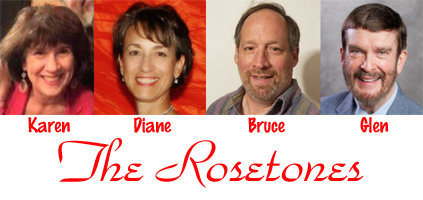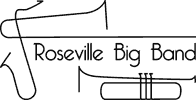Concert in the Frank Rog Amphitheatre, July 28, 2020, 7:00 - 7:55 p.m.

Concert in the Frank Rog Amphitheatre, July 28, 2020, 7:00 - 7:55 p.m. |
 |
Southeast Corner of County Road C and Lexington Ave., Roseville, Minnesota 55113 |
Produced by Glen Newton |
Click here for a map. |
|
This concert features The Rosetones
Somebody Loves Me* by B. G. DeSylva, George Gershwin, and Ballard McDonald (1924), arr. by Dave Wolpe, vocal arr. by Glen Newton ; featured in the Broadway revue 'George White's Scandals of 1924', later featured in five different films, including being sung by Doris Day in the 1951 film 'Lullaby of Broadway'
(Featured: The quartet, with a voiceover by Glen, welcoming the audience and introducing the group and the song)
Don't Sit Under the Apple Tree by Lew Brown, Charles Tobias, and Sam Stept (1939); originally titled "Anywhere the Bluebird Goes", Stept's melody is an updated version of the 19th century English folk song, "Long, Long Ago"; with lyrics by Brown and Tobias, its debut was in the 1939 musical "Yokel Boy"; but after the US entered WWII in December 1941, they upodated the lyrics, including the phrase "... till I come marching home."; recorded in February, 1942, by Glenn Miller with Tex Beneke and the Modernaires on the vocals, then featured in May, 1942, in the film "Private Buckaroo" performed by the Andrews Sisters with the Harry James orchestra; their version was inducted into the Grammy Hall of Fame in 2016. Kay Kyser's orchestra also had a hit recording, joining the Miller and Andrews Sisters versions to make it one ofhte few songs in history to have three different recordings on the radio hit parade at the same time.
(Featured solos: Bruce, Glen, and Karen)
Love is Here to Stay by George and Ira Gershwin (1938), arr. by Dave Wolpe, vocal arr. by Glen Newton; first performed by Kenny Baker in "The Goldwyn Follies" in 1938, it became popular when sung by Gene Kelly to Leslie Caron in the film "American in Paris" in 1951, but some of our audience members will have first heard the song in the movie "When Harry Met Sally" (1989), sung by Louis Armstrong and Ella Fitzgerald.
(Featured: Bruce, with a muted trumpet solo by Glen)
Nice Work If You Can Get It by George Gershwin (music) and Ira Gershwin (lyrics) (1937), arr. by Dave Wolpe, vocal arr. by Glen Newton; featured in the movie "A Damsel in Distress", sung by Fred Astaire, with backing vocals by the Stafford Sisters; the Andrews Sisters were among the artists who had a hit recording of the song; like "Love is Here to Stay", it was featured in the film "American in Paris", Georges Guetary sang it in the film; it was also featured in the 1992 Tony-award-winning "new Gershwin Musical Comedy", "Crazy for You" and the musical "Nice Work if You Can Get It" in 2012.
(Featured: Karen, with a trombone solo by Glen)
I Won't Last a Day without You by Paul Williams (lyrics) and Roger Nichols (music) (1971), arr. by Glen Newton, based on Bob Lowden's big band arrangement; the 9th #1 hit song recorded by Richard and Karen Carpenter, and the third of their hits from this songwriting team, who also wrote "We've Only Just Begun" and "Rainy Days and Mondays".
(Featured: Bruce)
Boogie Woogie Bugle Boy by Don Raye and Hughie Prince (1940), arr. by Glen Newton; a major hit recording in 1941 for the Twin Cities' own Andrews Sisters (alto LaVerne, soprano Maxene, and lead Patty), the most popular female vocal group of the first half of the 20th century, who were inducted into the Minnesota Rock/Country Hall of Fame in May 2006.
(Featured as the Andrews Sisters: Bruce (Maxene), Karen (Patty), and Diane (LaVerne); in the title role as the bugle boy on trumpet: Glen)
I've Got a Gal in Kalamazoo by Mack Gordon and Harry Warren (1942), arr. by Mike Carubia; featured in the movie "Orchestra Wives", this song was a #1 hit for Glenn Miller. Like "Don't Sit Under the Apple Tree", the recording featured tenor saxophonist/vocalist Tex Beneke and The Modernaires. It popularized the city of Kalamazoo, Michigan, the home of Western Michigan University and five other colleges.
(Featured: The quartet, with Glen in the Tex Beneke role, and Karen, Diane, and Bruce as The Modernaires)
The Glory of Love by Billy Hill (1936), arr. by Dave Wolpe, vocal arr. by Glen Newton; Benny Goodman's 1936 recording was a #1 pop hit in 1936. After saying goodbye to his carerr as a violinst with the Boston Symphony, Hill turned to songwriting. His first big hit, in 1933, was "The Last Roundup", and his string of hits made him one of the most successful songwriters in Tin Pan Alley. "The Glory of Love" was his biggest hit, even bigger than "Have You Ever Been Lonely", whose lyrics he wrote under the pseudonym of George "Funky" Brown.
(Featured: The quartet, with a brief trombone solo by Glen)
Moon River by Henry Mancini and Johnny Mercer (1961), arr. by Glen Newton, based on Joe Reisman's big band arrangement. Featured in the 1961 movie Breakfast at Tiffany's, it won an Academy Award for Best Original Song. It also won the 1962 Grammy Awards for Record of the Year and Song of the year. It became the theme song for Andy Williams, who performed it at the 1962 Academy Awards ceremony and named his autobiography "Moon River and Me". Mercer originally wrote the lyrics under the title "Blue River", but after learning that the title was already used, changed it to "Moon River". An inlet near Savannah, Georgia, Johnny Mercer's hometown, was named Moon River in honor of him and this song.
(Featured duet: Karen and Bruce)
It's Only a Paper Moon by Billy Rose, E. Y. Harburg, and Harold Arlen (1932), arr. by Jerry Nowak; originally titled "If You Believe in Me" and featured in the short-running play, "The Great Magoo"; later appeared in the 1933 film version of "Take a Chance" with its current title; still later it was the title song of the 1973 film "Paper Moon" starring Ryan and Tatum O'Neill.
(Duet: Karen and Glen)
Georgia on My Mind* by Hoagy Carmichael and Stuart Gorrell (1930), band arr. by Dave Wolpe, vocal arr. by Glen Newton; in 1979, the state of Georgia designated it the official state song. If you watched the CBS sitcom Designing Women from 1986 through 1993, you'd have heard this song every week as the show's sitcom. If you're a fan of drum and bugle corps, you'e probably heard it performed as a warmup or encore by the Spirit of Atlanta Drum and Bugle Corps. And if you're a country music fan, you know it from Ray Charles' 1960 hit recording and WIllie Nelson's chart-topping and Grammy-winning performance in 1978.
(Featured: The quartet, with a muted trombone solo by Glen)
The Lady is a Tramp* by Lorenz Hart and Richard Rodgers (1937), arr. by Dave Wolpe; from the musical "Babes in Arms", it's been covered by artists as diverse as Tommy Dorsey and His Orchestra (1937) and the duettists Tony Bennett and Lady Gaga (2011).
(Featured: The quartet, with a trumpet solo by Glen)
Someone to Watch Over Me by George and Ira Gershwin (1926), arr. by Dave Wolpe; from the musical "Oh, Kay", sung on Broadway by English actress Gertrude Lawrence; originally George Gershwin wrote the music as a "fast and jazzy" up-tempo swing tune, but by the end of the 1940, the slow ballad form, like the one we'll perform, had become the standard.
(Featured: Karen)
On the Sunny Side of the Street by Jimmy McHugh and Dorothy Fields (1930), arr. by Mike Carubia; #10 on Billboard Magazine's 1955 list; introduced in the Broadway musical "Lew Leslie's International Review"; the recording by Tommy Dorsey's Orchestra with the vocal by the Clark Sisters (aka The Sentimentalists) was Mike Carubia's inspiration for this arrangement.
(Featured: The quartet, with a brief trumpet solo by Glen)
It Don't Mean a Thing if It Ain't Got That Swing by Duke Ellington (music) and Irving Mills (lyrics) (1931), arr. by Mike Carubia; composed during intermissions at Chicago's Lincoln Tavern and first recorded as an instrumental by Ellington in 1932; he credited his trumpeter Bubber Miley, famous for his plunger muted solos, with the credo that became the title of the song.
(Featured: The quartet, with a plunger-muted trumpet solo by Glen, channeling Bubber Miley)
Encore: Boogie Woogie Bugle Boy
The Rosetones: Karen Dunn, Diane Dolinar, Bruce Stasch, and Glen Newton often perform with the Roseville Big Band.
92 people attended the concert.
* Background track is a recording of the Roseville Big Band; other tracks were synthesized by Glen Newton
